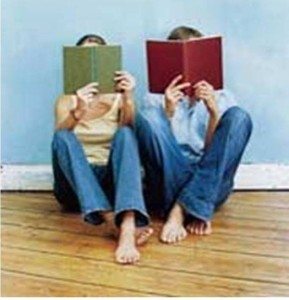Are books attractive?
[dropcap]L[/dropcap]ast month, the National Literacy Trust (NLT) published results of a survey, revealing that fewer children are reading outside of school, with just a quarter of children reading for pleasure.
So how worried do we have to be about the attractiveness of books? Are they attractive? Are books dead?
It is tempting to think that reading is getting more passé by the day. Many articles about the NLT’s survey blamed the decline in reading on the increasingly accessible entertainment technologies. Something I’ve noticed is that even children in pushchairs are playing Angry Birds on their parents’ iPads, a sight that is not all that uncommon in our age.
 However, whilst the smartphone may appear to be the new way to pacify children, I wonder whether the issue is a bit more complex than focusing on apps and websites as the sole source of blame. I don’t feel like electronic play has to necessarily suppress literacy. Is the idea that parents to treat Angry Birds as a narrative too ridiculous to suggest? “Why do you think the birds and pigs are fighting? What does this say about the world?”
However, whilst the smartphone may appear to be the new way to pacify children, I wonder whether the issue is a bit more complex than focusing on apps and websites as the sole source of blame. I don’t feel like electronic play has to necessarily suppress literacy. Is the idea that parents to treat Angry Birds as a narrative too ridiculous to suggest? “Why do you think the birds and pigs are fighting? What does this say about the world?”
In fact, while I think books are an integral foundation for good reading, writing and speaking skills, I wonder what we can do to stop ourselves from losing these children to a lifetime alienated from the joy of stories. When we see such disheartening statistics, is there a way to ameliorate them? Surely there is a possibility to promote literacy online as well as in physical books?
I do think there is legitimacy in the fear that literary rates correlate with the decline of reading of books for pleasure. Yet we can’t ignore the Apple-logoed elephant in the room. I do understand the fears of a heavy reliance on technology: the threat of strained eyes, lack of sleep, the antisocial element, the bottomlessness of the internet (strangely enough, there were similar fears when the popular novel first gained precedence).
If anything, the part of the report that concerned me most was the idea that children were actively put off from books by their peers because books are seen to be “embarrassing” or “geeky”. The fact that children are put off in general from something that would otherwise enrich their minds substantiates fears about illiteracy. The question of the attractiveness of books therefore comes to the forefront – are books a thing of the past, even for children?
It’s not too late to help those who have an aptitude for reading books but who may have been put off by outside influences. Projects like Warwick Volunteers’ own ‘Right to Read’ allows volunteers to go into classrooms to help with student literacy and often dispel the fears articulated in the aforementioned articles. Warwick volunteer Louise Boeckmans said: “Unlike what [the articles] suggest, I’ve found that children were very enthusiastic about reading. This only increased as the Right to Read project continued. This wasn’t just for the good readers but from my experience, I found that even the children who were struggling with reading were equally excited and couldn’t wait to read whenever I went into the school.”
Therefore, it seems that it’s not that children lack the ability or attention to read; it’s just that books sometimes need to become attractive. The Books section at the Boar therefore decided to quiz Warwick students on their perception of the attractiveness of books compared with their childhood…
Are books attractive? The survey.
Of course being the Books section of a university newspaper, we knew that the demographic of those who were answering our survey would probably be a bit more biased towards the magic of books. Warwick is an academic institution after all.
Whilst we had many people from English Literature based degrees answer our survey, we also had people from Sociology, MORSE, Computer Science, Politics and Philosophy and Electronic Engineering to name a few.
 Overall, 61 percent of the 36 students quizzed said that they read every day, reflecting the academic and often book based structure of many degrees (the majority of respondents, 75 percent, studied BA degrees). In contrast, only 8 percent of those surveyed read a book for pleasure every day – in fact, exactly half of the total people surveyed said that their reading for pleasure differs greatly depending on the time of year. The comments following this particular question were all on the same wavelength: “[I never] read in term time. I binge over holidays”, “[I don’t read] lots in term but in holidays and on train journeys, I read a lot”, “[I read] rarely during term but as often as possible outside term time”. Therefore, we see the irony that, in spite of the importance of reading to a lot of academic disciplines, the act of taking up a degree actually tends to stunt the ability to read for pleasure, at least during term time.
Overall, 61 percent of the 36 students quizzed said that they read every day, reflecting the academic and often book based structure of many degrees (the majority of respondents, 75 percent, studied BA degrees). In contrast, only 8 percent of those surveyed read a book for pleasure every day – in fact, exactly half of the total people surveyed said that their reading for pleasure differs greatly depending on the time of year. The comments following this particular question were all on the same wavelength: “[I never] read in term time. I binge over holidays”, “[I don’t read] lots in term but in holidays and on train journeys, I read a lot”, “[I read] rarely during term but as often as possible outside term time”. Therefore, we see the irony that, in spite of the importance of reading to a lot of academic disciplines, the act of taking up a degree actually tends to stunt the ability to read for pleasure, at least during term time.
A third of people felt they read just as much back in childhood as they do now, whilst a third feel like they read generally more. The remaining third therefore feel like they read generally less, producing an evenly mixed response to the question of how much people used to and continue to read. People on the whole found and still find books to be attractive , with 96 percent of people finding books to be “extremely attractive”, “very attractive” and “attractive” both as a child and today.
“I think you appreciate books and literature generally far more now as students but you lose some of the magic and allure that reading as a child brings”, reflected Richard Brown, thus showing the different ways in which attractiveness is perceived in books over time.
Considering that we as students are leaving the ugliness of adolescence behind, the survey also decided to gauge the attractiveness of reading in the physical sense – is someone who is reading Jack Kerouac’s On the Road somewhat more of an attractive dating prospect than someone who publicly denounces books?
68 percent of respondents answered the question of “how attractive do you people who say they don’t read?” with “unattractive“, “very unattractive” or “extremely unattractive”, while 73 percent answered the question “how attractive do you find people who say they do read?” with “attractive“, “very attractive” or “extremely attractive”. Warwick students seem to find an explicit interest in reading to be an attractive quality. Taking your week’s reading to Pop!, however, might not quite improve your chances… well, who knows?
One respondent detailed a romantic story about how a love for books instigated her current relationship: “My first conversation with my current girlfriend was about this series of children’s books called ‘Warrior Cats’ that we both used to read, so I’d say that a shared interest in books is definitely a good indicator of romantic compatibility!”
The wording of the next question “how attractive is someone who reads in public compared to those who don’t read?” was admittedly a rather leading question – the absence of doing something in public is neither attractive nor unattractive and so we received mostly neutral responses. But perhaps unsurprisingly, people who did answer were generally more positive and more disposed to being attracted to people who read books in public than those who don’t.
First year Sandeep Purewal commented: “I don’t think that it is news that reading is attractive. I can’t stand it when I come across people who say they never read as if being ignorant is ‘cool’. Luckily, I haven’t met anyone like that at Warwick yet.”
Additionally, English Literature student Sian Elvin stressed the importance of book choice when physical attraction is concerned: “It depends on what books they read! 50 Shades of Grey is a definite no-no.” It transpires that 50 Shades is something that will perhaps prove hazardous for your love life, with another student anonymously exclaiming: “I SAW SOMEONE WALK INTO A LAMPPOST ONCE READING 50 SHADES IT WAS DEAD FUNNY”.
Therefore, whilst the findings from this survey show that at least a particular cross section of the Warwick student population isn’t losing its engagement with books anytime soon, we are extremely lucky to have been encouraged to read from an early age. Therefore, surveys such as that by the National Literary Trust and projects such as Right to Read show how we need to stay in touch with those who need to experience the same literary magic many Warwick students received as children and continue to have daily.

Comments